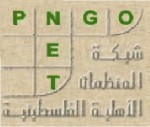PNGO:
PNGO was established in September 1993, as a response to the signing of the Oslo Agreements with the objective of enhancing coordination, consultation and cooperation between member organizations working in different developmental domains. Because of the security measurements imposed by the Israel which divided Gaza Strip (GS) and West Bank (WB) into disconnected areas, PNGO adopted to continue its work through its two main offices in GS and WB. These offices are managed by two Coordination Committees elected by the general assembly which represents PNGO members. PNGO carry out its activities through different committees from its members working in the following five main sectors: health, democracy and human rights, women and children, rehabilitation and agriculture. Any NGO can join PNGO once it meets a set of criteria. PNGO role is to establish general guidelines and coordinate the NGOs work but has no line authority on the NGOs. At present, PNGO boasts of 135 national NGOs in the West Bank and Gaza Strip that work across sectors in different developmental fields
During the past fifteen years PNGO has become an important component of the Palestinian society. PNGO has become an important reference and mechanism for coordinating the Non-Governmental sector. It has succeeded in establishing relations with different civil society organizations, such as the ‘Palestinian Union of Charitable Societies’, the ‘National Institute for NGOs’, the various Palestinian Political Parties and the Professional Unions.
PNGO is a coordination body for the NGO sector in Palestine with the purpose of strengthening the Palestinian civil society and contributing to the establishment of the Palestinian state based on the principles of democracy, social justice, rule of law, tolerance, and respect of human rights through networking, building-up the capacity of NGOs, developing information management center and mainstreaming of society concerns into public policies, plans and programs.
As a network, PNGO works to influence decision-makers in a manner that ensures that all laws, legislations and policies are directed towards creating a legal environment that is responsive to the development needs of the Palestinian people, and the creation of sustainable human development policies. In doing so, PNGO encourages the local and grassroots organizations in debates concerning the fundamentals of development, democratic governance as well as other global development agendas.
The NGO sector in Palestine, and The Palestinian NGO Network as one of its major forces, believe that one of the keys to success for any organization or body is coordination and networking. PNGO asserts that structured networking efforts help the member organizations to join forces, avoid duplication, and agree on common political and social visions. In this context, PNGO promotes coordination, cooperation and consultation not only among Palestinian NGOs, but also between the Palestinian NGO sector and the different bodies of the Palestinian society. The establishment of a common platform becomes even more vital while witnessing the current political segregation and ever more increased travel impediments between the West Bank, Jerusalem and the Gaza Strip. At the same time PNGO is engaged in a wider process of enhancing civil society coordination and strengthening process. PNGO was instrumental in developing a forum of civil society organizations that is meant to present an independent voice of civil society in Palestine. As a matter of fact the civil society forum is crucial in addressing issues like democratic and social transformation and forwarding the agenda of reform at all levels.
Vision:
A leading civil society network that plays primary role in developing a civil society that is independent, free of occupation and sustainable where Palestinians enjoy democracy, tolerance, dignity, social justice, rule of law and respect of human rights
Mission:
PNGO is a coordination framework for the NGO sector in Palestine that has a developmental vision towards; empowering and protecting the autonomy of the CS, consolidating its role in the national struggle and democratization process,based on the principles of democracy, social justice, rule of law and respect for human rightsthrough; lobbying public opinion, mainstreaming of society concerns into public policies, plans and programs, contributing to mobilizing civil society resources and consolidating coordination and networking.
Mission Statement
Empowering and protecting the autonomy of the Palestinian civil society, consolidating its role in the national struggle and democratization process based on the principles of democracy, social justice, rule of law, tolerance, and respect of human rights
Overall goal
PNGO’s overall goal is to reinforce the role played by NGOs through contributing to the development and empowerment of civil society within an independent democratic Palestinian state based on the principles of democracy, social justice, and respect for human rights
Objectives
PNGO believes that the above-mentioned goal can be achieved by addressing the following objectives:
PNGO Objectives:
Objective I: To contribute to the national resistance to end the occupation and to defend the legitimate national rights of the Palestinian people.
Work Strategies: Promoting the role of PNGO
Advocating for popular international campaigns in support of the Palestinian cause.
Further developing the legal dimensions of Israel’s violation of International Law against the Palestinian people.
Empower the role of civil society organizations in Jerusalem.
Contribute to protecting the rights of refugees in conjunction with UN Resolution 194.
Objective II: To contribute to the retrieval of the Palestinian national unity.
Work Strategies:
Contributing to strengthening the social fabric of the Palestinian community.
Advocating for a media discourse which calls for national unity.
Increasing communication between Palestinians inside the West Bank, the Gaza Strip, and the Diaspora.
Promoting tolerance and the acceptance of difference within the social fabric of the Palestinian community.
Objective III: To contribute to protecting public liberties and citizens’ rights.
Work Strategies:
Advocating for a unified democratic legal national media discourse that calls for the respect of public freedoms.
Creating and developing coalitions and alliances in civil society.
Utilizing the competencies of civilsociety in defendingthe rights and freedoms of individual citizens.
Advocating and lobbying in order to safeguard public and individual freedoms.
Objective IV: To contribute to the mainstreamingof societal concerns into public by employing policies, legislations, plans and programs in a way that feeds into strengthening the steadfastness of the Palestinian people and serves into protecting the rights and interests of the poor and marginalized populations.
Work Strategies:
Further developing the vision of civil society’s perspective on development for a just society.
Mobilizing the capacities of the local community to participatein advocating for public issues of concern to the society as whole.
Developing and activating coordination between the sectors.
Urging the Authority to provide services on the basis of equality and social justice.
Encouraging the donors to respond to the priorities and needs of national development.
Objective V: To protect the autonomy of the civil society work (on the national and international levels), to empower it and toconsolidateits role in the establishment of an independent and democraticPalestinian state.
Work strategies:
Enhancing non-governmental organizations’ knowledge of the laws relating to charities.
Following up and documenting the violations of the law of charities and non-governmental organizations.
Protecting the organizations whose litigation rights have been violated.
Lobby, mobilize, and impact decision makers to advocate for the respect of public and individual freedoms.
Objective VI: To enhance the organizational capacities of PNGO and promote coordination and cooperation among PNGO sectors on the one hand, and between the sectors and the different bodies on the national, regional and international levels.
Work Strategies:
Developing and activating the process of sectoral planning.
Consolidate transparency, accountability and good governance principles among civil society organizations
Improving the cognitive efficiency of PNGO by enhancing the performance, and leadership skills of its employees.
Improved communication mechanisms among the PNGO general assembly and steering committee in the West Bank and Gaza Strip.
Activating, developing and expanding NGOs’ participation in forums, networks, local and Arabic federations, and international coalitions that share the Network’s vision and strategy.
Developing and promoting financial sustainability.
Reviewing and improving the administrative, financial and information systems.





